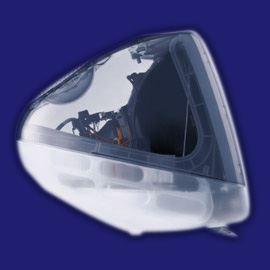 The current line of computers from Apple consists of four main components: Consumer Desktop (iMac), Consumer Portable (iBook), Professional Desktop (G4), and Professional Portable (Powerbook G3).
The current line of computers from Apple consists of four main components: Consumer Desktop (iMac), Consumer Portable (iBook), Professional Desktop (G4), and Professional Portable (Powerbook G3).Since my area of knowledge is the Macintosh platform, I'll focus on that here, though I can suggest -- based on suggestions from users of multiple platforms -- if you want to buy a Windows PC, that buying a quality brand like Hewlett Packard over cheap-o "Free with binding ISP contract in blood," or $500 eMachines and Compaq PCs, makes all the difference (Macs go through a rigorous quality-control process, if you were wondering).
 The current line of computers from Apple consists of four main components: Consumer Desktop (iMac), Consumer Portable (iBook), Professional Desktop (G4), and Professional Portable (Powerbook G3).
The current line of computers from Apple consists of four main components: Consumer Desktop (iMac), Consumer Portable (iBook), Professional Desktop (G4), and Professional Portable (Powerbook G3).
The iMac is for the home or office user who wants to send e-mail, browse the Web, do their own accounting and taxes, and stuff like that. Editor in Chief of MacToday Magazine -- a publication for graphics people -- Scott Kelby suggests that it's a surprisingly good computer for general graphics and publishing work.
The current iMac line is divided thusly:
Can I Play a DVD Movie on an iMac, and Watch it on a TV?
The iMacs DV and DV Special Edition come with VGA out, which can't be hooked directly to a TV, but there are products, such as Powerr's hundred dollar iPresenter which make the connection possible. Though it installs in the chassis of the "old" iMacs, I reckon with the use of a short male-male RGB cable you could connect it to the VGA port of the new DV models, and you'd want to enclose the little board in an instrument case. Though I haven't confirmed this -- if anyone knows why it wouldn't work, please write me. Also available is Focus Enhancements' i-TV-View DV, for a hundred and forty bucks, which is designed for use with the iMac DV -- Cool :)
The iBook is the iMac's portable counterpart. Marketed toward students, it features an extra thick rubber coating which also serves as a color accent. Articles I've read about the iBook have lauded its durability, with one author tossing it high in the air, so that it grazes a light fixture, and, after several slams against a metal table leg, the iBook functions unscathed.
The G4 is meant for professionals, primarily, but it's price is low enough not to be prohibitive to the less experienced user, in my opinion. Its processor can perform more than a billion floating point operations per second, and its special vector processing unit, dubbed cornily, "The Velocity Engine," adds a speed boost to heavy-duty programs like Adobe Photoshop. The CEO of Adobe remarked that "[...]the G4 is significantly faster than any platform we've seen running Photoshop 5.5."
The Floppy Factor
Some people are really alarmed that the new Macs don't include floppy drives, but the truth of the matters is, with the size of files growing every year, floppy disks don't hold enough, and those files that can be fit on a floppy can be sent over the Internet instead, or over an Ethernet network (almost every Mac can be networked right out of the box). However, there will probably come a time when you're going to need a floppy disk, and you have a couple of options. You can either buy an external floppy drive, or an Imation SuperDisk drive. In addition to reading standard floppies, the SuperDisk drive can use Imation's own SuperDisks, which can hold up to 120MB.